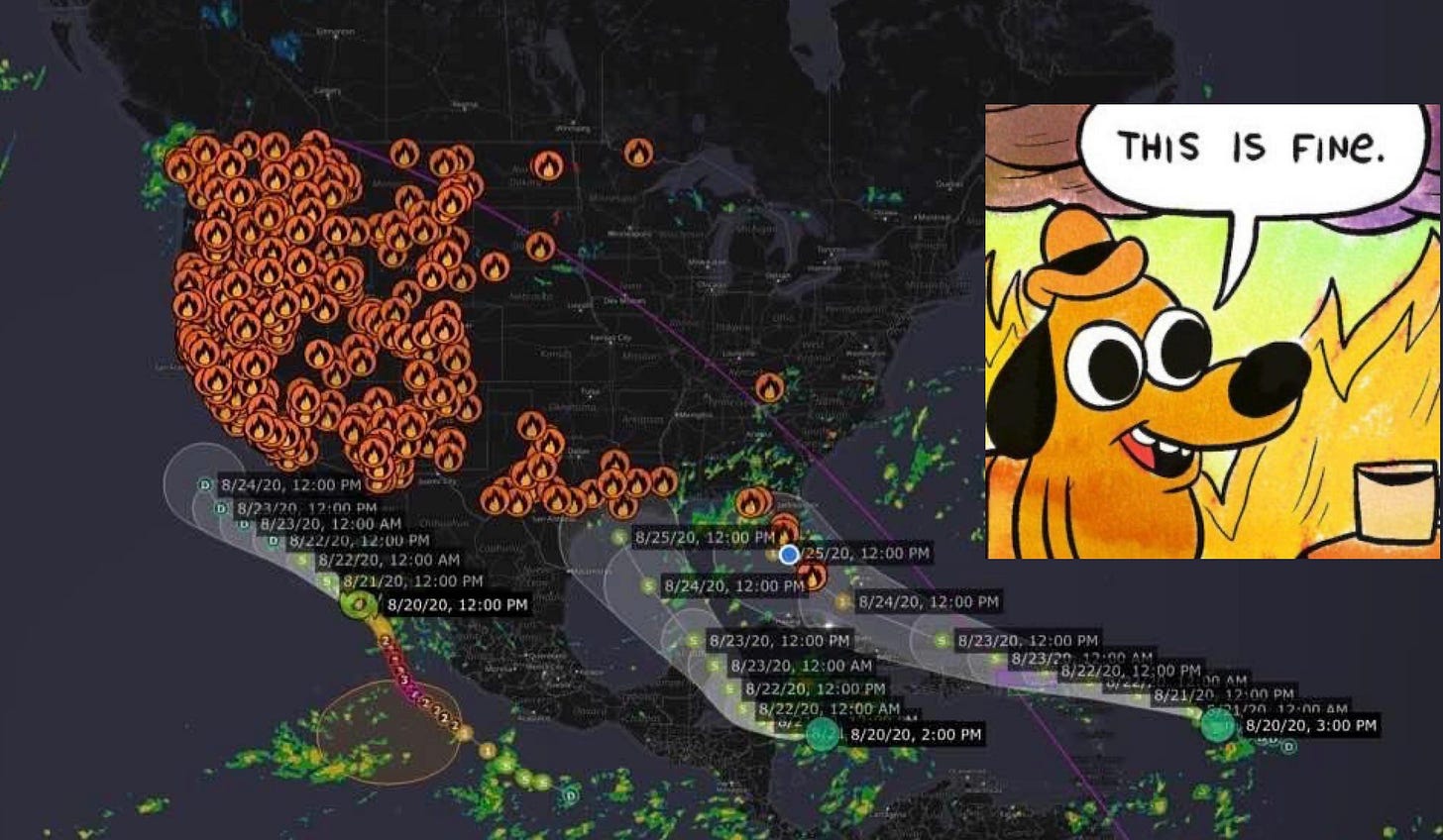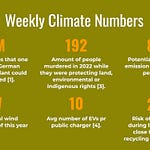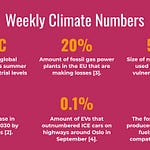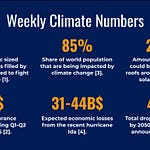Welcome to this weeks edition of The Weekly Climate! 🎉

First off, I want to extend my thanks to the great reception that the newsletter has received so far. Thank you for subscribing and reading it! 🙏
Secondly, the U.S. is taking a severe beating these days. Two hurricanes entering the Gulf, more than 500 wildfires burning in California alone along with heatwaves triggering blackouts, a COVID situation that appear totally out of control and a president (and the fossil fuel industry for that matter) that appears to be taking pages out of Hitlers playbook (the news about what’s happening with the postal service is so scary). My thoughts and prayers goes to the people in the U.S. these days. Although COVID is probably not climate change related, just about everything else about the U.S. misery is. What’s happening in the U.S. right now appear to be a dress rehearsal for the entire world.
In this weeks edition I decided to add a section on “Stories we follow” which is basically an update on stories from previous editions of the newsletter. In this case, we keep a close eye on the situation in California both regarding the wildfires, but also in terms of their recent power troubles amidst the heat wave.
Executive summary — A couple of major news items has filled this week. First of all, Californias woes with blackouts and wildfires, the U.S. presidential election following Bidens Climate Change betrayal and later retraction and a lot of debate and articles about green hydrogen. There was a also number of developments surrounding sustainable investments, both good (from the EU) and bad (from the U.S.)
Ok, on to the main content!
‼️ If you can only read one article this week
The most important article this week is actually two podcasts! 😬 I know I know! I’m still experimenting with the best way to write this newsletter so I hope you‘ll bear with me. Trust me this is probably the most important, mindbogling and positive learning that I’ve learned about climate change for a while.
The common theme of the two podcasts is that in order to solve climate change, we don’t need to do it for the sake of climate change. We need to do it for health and economic reasons — and here’s the punchline — ALONE. We need to do it for health and economic reasons alone! We don’t need climate change to see that rapid decarboniazation is the right way to go. Obviously, I’m doing it for climate change, but we as a society don’t need to do it just for the sake of climate change. Ok, here are the two podcasts.
In the Energy Gang episode this week the gang goes through a study that showed that air pollution is way more damaging to our health than we thought (which I shared last week). The crucial point that the Energy Gang hammer home here is the fact that even if no other country follows a long with similar policies for climate change reasons, the health benefits alone will more than pay for those decarbonizing policies. The study shows that even if the U.S. was the only country which follows a 2C pathway, then the U.S. would still get the health benefits and thus societal and economic cost savings that comes with that! Why is this important? This is important because it just shows that whether you look at it from a climate or a health perspective the solution is the same: Massive decarbonization and getting to zero emissions as fast as possible — even in the local economies. You can throw climate change in the bin and even then will the right thing be to decarbonize and get to zero emissions. This is so important because it gives us yet another argument against inactive politicians that they can’t possibly ignore. And it gives politicians supportive of the cause an argument that opposition can’t possibly argue with. Economics and public health interests. To take a low key pragmatic example, the gang discusses Chicago which exchanged their busses with electric one’s which save the city 40K$ a piece every year in reduced health costs etc, which means that bus has paid for itself in less than five years. Here’s a link to the energy gang podcast and the section where they discuss this (the whole podcast is highly listen-worthy as we will discuss later).
The other podcast — Gimlet Media’s new “How to save a planet” — touches on the same thing but from a micro angle. It tells the story of Somerset, MA, which had a big coal power plant that everybody in the city knew and loved. Why? Because it provided a big tax revenue to the city this meant that Somerset had all the amenities of a big city. That in itself is an interesting story about the human side of climate change. But that’s not the point I want to make here. So the story continues and in the early 2000s fracking came along and with lower prices for fossil gas the beloved coal plant got killed. The city had to fix a gaping hole in their budget and they turned to the most profitable source they could find: Offshore wind. Did Somerset pick wind because of climate change? No, they did it because it made the most economic and societal sense.
🕵️♂️Stories we follow
California power outages amidst the heat waves. (Get an overview) California has experienced a series of rolling blackouts Aug 16 through 18 as a result of high power demand and a few mishaps. What we know is that power demand was high, but not higher than usual, when solar started to drop and a fossil gas power plant went unexpectedly offline. This story is interesting because it allows us to peak into the future where heat waves is the new normal coupled with high renewable energy penetration. The blame game is on. It’s clear that the classic renewable intermittency problem did play a role. Yes as the sun went down solar power output did drop — as one would expect. That was when the grid operator relied on a fossil gas plant, which unfortunately went offline. So in cases of high power demand you need either storage or some other technologies to come online. And that’s what makes it so sad that California in 2012 took a nuclear power plant offline (2.200MW) and are not extending another’s license. So who’s really to blame? Renewables and their intermittency? The fossil gas plant for not working in the heat? Or the utility or grid operator for not planning properly? But you know who could be the saviors? You and me. Prior to the outages the grid operator sent out alerts asking consumers to lower their power demand and it worked. It reduced the power consumption by almost 4-5000 MW (~10% of total power consumption)! Unfortunately, though it wasn’t enough to actually stop the outages, but still it shows that consumers and industry are willing to reduce their power consumption when required. Demand response FTW 🏆.
U.S. Presidential Election. The U.S. is a major emitter and are currently run by narcissistic fascist. We need a change. And after Joe Biden was elected as the democratic candidate that change has to be him. Hence we keep a close watch on his climate aspirations. NYTimes reports that ‘climate donors’ rush to Biden in an attempt to counter Trumps fossil fuel donors (see last week’s newsletter). Unfortunately, still outnumbered in donations, climate donors are a substantial part of Biden’s campaign funding. That’s also why it was so shocking to learn earlier this week that the Democratic National Committee had silently dropped language in it’s plan to end fossil fuel subsidies. Emily Atkin of Heated called it The Democrats Climate Betrayal, which is pretty accurate. Recall that fossil fuel subsidies in the U.S. currently amounts to 20B$ (and up to 649B$ depending on how it’s calculated). Biden later said he was still committed to ending fossil fuel subsidies but it remain a mystery whether the party is as well.
👩🔬Climate & Science
The highest temperature at least since 1931 was recorded in Death Valley on August 16: 130F or 59C!
California currently has more than 500 wildfires burning. 100.000 people evacuated. Big Basin National Park, California’s oldest state park, along with Joshua Tree is burning. Two wildfire complexes have grown to become the 2nd and 3rd largest wildfires ever. Many of these although started by “a lightning siege” — over 11.000 lightning strikes in 72 hours — blame is put on climate change for exacerbating the problem with intense dryness and heatwaves. Many albeit richer residents are even taking to largely unproven ways to protect their homes using anything from untested, and according to a Santa Barbara law suit, toxic fire retardant spray to hiring private fire fighters (yes that last one was Kanye).
And on the other end of the scale we have China and much of Asia is expected to suffer greatly from flooding in the coming years. Already this year flooding along the Brahmaputra river has displaced 3 million people in India and 25% of Bangladesh is under water.
🤖Technology
Hydrogen is hot these days (pun intended). However, as Greentech media notes, many major utilities such as Ørsted does not expect to profit from hydrogen investments any time soon. In a recent earnings call, Ørsted’s CEO doesn’t expect profits from hydrogen investments this side of 2025. Hydrogen is interesting as it could promise solutions for harder to decarbonize sectors such as aviation. For more information on hydrogen, check out this weeks member only My Climate Journey podcast for a great discussion about hydrogen (see the podcast section) and we’re also going to talk more about hydrogen in the startups section.
A new study shows that if electric vehicles in the U.S. replaced 25% of combustion engine cars the U.S. would save 17B$ annually due to avoided damages from climate change and air pollution. If raised to 75% savings amount to 70B$ annually. In addition to the savings in dollars, the U.S. would also save hundreds or thousands of lives. This one is related to a story from last week in which a new study indicated that 700B$ could be saved annually by the U.S. alone in a zero carbon world.
Der Spiegel interviewed two energy experts: One pro-nuclear and one anti-nuclear. If you ignore the interviewers silly questions such as suggesting fossil gas plants as a climate solution or a bridge fuel then the interview is actually rather interesting. I think it covers many of the major debates regarding nuclear or not. IMHO keeping whatever nuclear we have is great. Building new plants are also great. Whatever we can do to keep cleaning our electricity grids. The main question is whether it can be done in time to make a difference.
💡Startups
Technically, a startup (although launched by Schneider Electric and Huck Capital) 5D Energy launches no-money down solar, storage and backup power for small and medium commercial and industrial (C&I) customers. As we’ve seen in California, backup power in the light of increasing extreme weather events might be an important selling point. One can only hope that they find a clean source to use…
The first IPO in the green hydrogen space is being planned in Australia. The company Infinite Blue Energy plans their IPO in Q1 of 2021 on the Australian ASX. Production from their first plant is expected to go live in 2022.
Northvolt, the swedish battery plant startup started by two former Tesla execs, gets a 525M$ loan guarantee from Germany for their Northvolt Two plant which are planned in Salzgitter, Germany. The plant will be operated together with VW and BMW there.
And more battery news. Tesla no longer has the largest battery. A company called LS Power just beat Tesla’s Hornsdale battery in Australia. The battery is deployed in California and can charge or discharge 230MW. This comes at a particular crucial time as noted earlier because of the recent California heat wave outages. At the time of the outages the battery had only stored 140MWh because of increased power demand on the grid.
💰Investing
The fossil fuel industry relies heavily on being able to borrow money from banks in order to be able to extract fossil fuels. That is in fact what what the whole divestment movement is all about — to make the banks take notice of the fossil fuel stock price and hence make fossil fuel industry investments look unprofitable. Now, new legislation in EU aims to pick that up a notch. If passed, asset managers may be required to quantify and disclose how much of their holdings degrade the environment. This is great news and it could provide a much needed climate upgrade to the ESG rating system. Related, in the U.S. it seems like the SASB metrics which is voluntary is picking up steam. Also check out this weeks Drilled podcast episode, which goes into detail about a new rule Trump is instating.
⛽️Major Carbon Emitters
In the recent weeks the oil spill in Mauritius has garnered a lot of attention. But a new one in Venezuela is more mysterious. On August 2 locals noticed the oil spill on the shores of the Falcón state. Nobody seem to know where it’s coming from, or they’re not telling at least. That’s why Venezuela’s National Assembly (the only institution which is not controlled by the government) opened an investigation into the spill. It seems likely that the spill came from nearby El Palito oil refinery, as satellite images showed an oil slick near the refinery on July 22. Researchers fear it will take half a century to clean.
U.S. Citizens: You are under attack! As expected during the U.S. election the fossil fuel lobby American Petroleum Institute (API) (you know, the guys behind the victory memo propaganda plan, #exxonknew and more) are running ads targetting 25-34 year olds that promotes fossil gas as clean (hint: It’s not). Even Shell are hesitant to market fossil gas as clean. The day after Joe Biden revealed his climate plan the API 6x’ed it’s ad spend on Facebook: “Natural gas is already clean, affordable and efficient - and it’s getting better every day” as one ad says 🙄.
In a detailed piece The Guardian reports how the gas industry is waging against climate action. In it they draw on several reports that indicate how the API of fossil gas called American Gas Association (AGA) and American Public Gas Association has relied on classic techniques to spread it’s propaganda messaging about fossil gas. For instance in an Instagram campaign, they paid influencers to #cookingwithgas. It also describes how the AGA and APGA mobilized a lobbying firm to explicitly work against the environmental groups. By now, unfortunately, news like this is not really surprising. Everyone knows that the fossil fuel industry fights dirty to win their war against humanity.
We talk a lot about aviation’s need to decarbonize, but shipping is big emitter too. Currently, world wide shipping emits 3% of the world’s carbon emissions. In a Bloomberg Green article they discuss the possible technology paths that shipping can go from Amonia to nuclear.
🎩Politics
Greta Thunberg wrote a piece in the Guardian summing up the past 2 years of climate action. And unfortunately, one have to agree with her that there’s a lot of talk, but apparently no / little will to take any considerable action. Last month Greta and a group of activists wrote an open letter to the global leaders with demands about what they must to do contribute to stop the climate crisis. Thursday Aug 20, the group met with Angela Merkel who now holds the presidency of the European Council to deliver the letter and while they appear to agree on the scale of the problem, they do not appear to be in agreement about how to solve it. For instance, political leaders believes it to be unthinkable to introduce a carbon tax that will have any effect at all.
I really love Emily Atkins reporting in a her newsletter Heated.world. This week she published a particular interesting way to describe a great program that they have running in the U.S. The program helps low income families pay their electricity bill in exchange for the government being allowed to inspect their house and upgrade it in terms of insulation and other things. This is especially important these days at many families in the U.S. struggles with paying their electricity bill after COVID19. Also Emily amazingly shows that anything - even this WAP song - can be turned into a climate story 👏.
The fascist in the oval office has signed an executive order that enables oil and gas companies to drill in the Artic National Wildlife Refuge… No further comments. 🤬
A new book by Jason Hickel, called Less is more, promotes the Degrowth strategy to solve the climate crisis. We all heard Greta Thunberg yell: “We are in the beginning of a mass extinction, and all you can talk about is money and fairy tales of eternal economic growth. How dare you!” And the Degrowth strategy has indeed been the favored strategy of many environmental organisations. The new book is another praise of the Malthusian Club of Rome and their book Limit’s to Growth and aims to show that all developed countries have got to stop growing in order for us to solve the climate crisis. The book stands in stark contrast to MITs Andrew McAfee’s book with a similar name “More from less” (Oct 2019) who claims the exact opposite. As with all extremes, I reckon the answer is somewhere in the middle.
⚖️Climate Justice
I’ve mentioned the floodings in Asia before, but this article takes a hugely important view, which is that the global media is almost totally silent about these floodings that occur in the global south. And as the author says “Ignoring climate change-induced suffering that the world’s poor are forced to bear makes it easier to pretend the climate crisis is some far-off problem to worry about in the future. But if we look around, it’s clear that the climate crisis is already here for the people of Bangladesh, India, China, the Bahamas, Mozambique, and others around the world.”
🎧Podcasts
My Climate Journey (Members only) — Episode 117: H2 Debate with Gene Berdichevsky & Jigar Shah: In this episode Jason connects us with two energy experts each holding contrarian views of the promise of hydrogen. Gene is bearish and Jigar is bullish. The discussion is excellent as it features many good and bad things about hydrogen. And it also goes to show that even experts like Gene and Jigar does not really have the answers to how big green hydrogen will be. NB! To listen to this podcast you need to be a member. MCJ shared a teaser on their free version of the podcast here.
Decouple — Existing nuclear and imaginary nuclear feat. Mark Nelson: This one was eye-opening. Dr Keefer and Mark discusses the role of Small Modular Reactors (SMRs) in nuclear. Mark presents an interesting theory that the reason why legislators and nuclear neutral folks like Generation 4 nuclear technologies, like SMR, is because they don’t exist yet. Mark mentions briefly a current SMR project that is having trouble getting through the Nuclear Regulatory Commission. In addition, they also touch upon the economics of SMRs. Finally, they also discuss the proposed closing of Ontarios Pickering Nuclear Generating Station.
Drilled — Big Oil Fighting Divestment: I can’t wait for the new season of Drilled to start, but until then Amy has been doing a couple of interviews with key developments around big oil. This week she discusses a new rule that Trump is instating that makes it harder for financial managers to put money in ESG funds. The new rule makes it a fiduciary duty for financial managers to solely invest with the focus of maximizing return. In other words, customers that want to invest in ESG even though it might give a lower return will have to do so themselves. As a response to this obviously, the fossil fuel industry is happy and wrote a letter openly stating that the divestment movement has become a serious problem for the industry. Yay 💪.
The Interchange — The Wild World of ESG: ESG is a rating system devised to help investors identify which companies do well on Environmental, Social and Governance aspects of their businesses. In this episode The Interchange discusses the impact of ESG. And to be honest the news is not good. Shayle and Steven reveals that depending on which company performs the rating companies are getting widely different ESG ratings. There’s a total lack of standardization and it’s frankly it’s more confusing than helpful. In fact, they even speculate that investors are losing faith in the system unless something is done.
Energy Gang — What caused California’s blackouts: I was quite thrilled to see that the three items the gang chose to discuss this week, I already brought before you, dear reader, last week! 😇 The three topics are California’s blackouts and who’s to blame, India’s coal plans and — what we already discussed — the study which shows that air pollution is more damaging than we thought. For California’s problems the gang touches on a key theme that I don’t think I found in any other of the coverage and that is equity. The fact that the citizens that were hit the hardest by the black outs where black communities. Another interesting discussion is around the Demand Response and how California is working with the citizens to help do this. They discuss a series of tweets by a guy with a Tesla battery who observed what his battery was doing before and during the blackouts, which just goes to show that California needs to embrace Demand Response fast. This is really a great episode and could have written the entire newsletter just on this episode.
How to save a planet — The Witch of the Wind: When I first saw Gimlet was making a podcast on climate change I was thrilled. I’ve always loved their podcasts especially the Startup one when they first started out. When I saw the title of it I became a tiny bit skeptical as it seems perhaps just a tad clickbaity — few people who are already active in the climate space know that it’s not really the planet that needs saving, but rather humanity and the species it coexist with. And the part about saving humanity is actually the exact point they hammer home in this episode! We already mentioned this podcasts as our most important “article” this week, so just go listen to it already!
That’s it for this week folks! If you feel like I’m missing something, please let me know. Don’t forget to subscribe to the newsletter, if you haven’t already and/or the podcast if you want this delivered in your ears every monday morning.
See you all next week 👋











